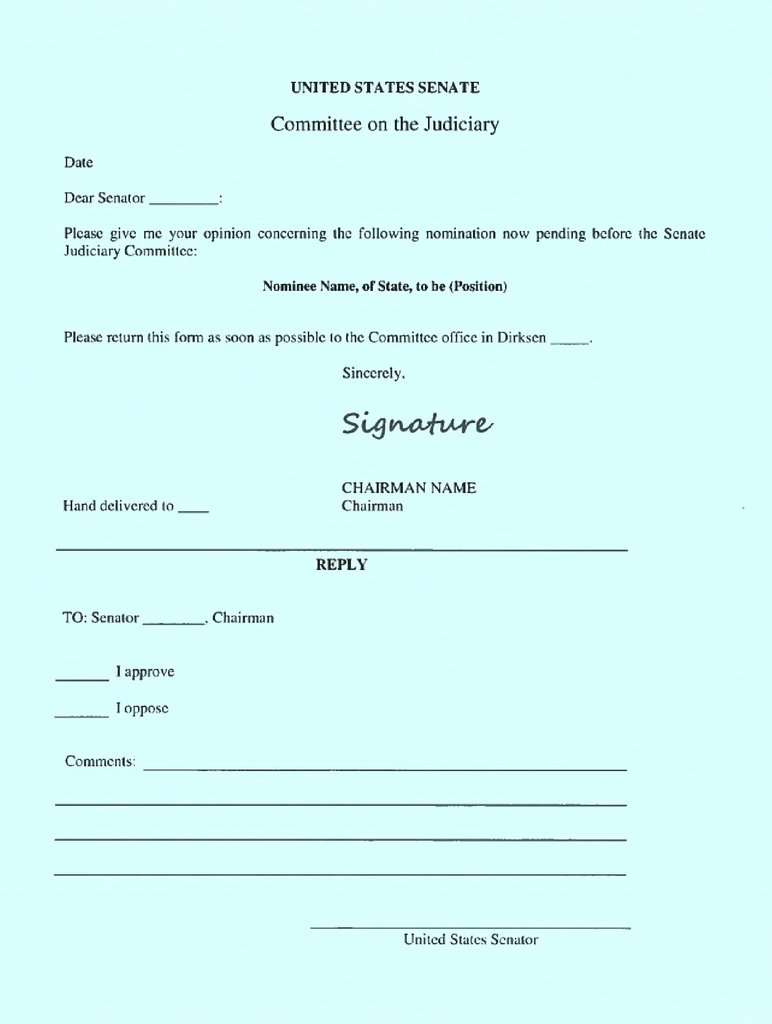Thus far, “Republicans” in Washington, D.C. have moved quickly to help confirm U.S. president Joe Biden’s nominees for key cabinet positions. In addition to not trying to block any of these appointments, most of the early Biden cabinet votes have been overwhelmingly bipartisan. But as Biden moves to remake the federal judiciary, he could encounter growing resistance from GOP lawmakers – and perhaps some Democrats (depending on the nominee).
For example, Biden’s rumored frontrunner for the position of U.S. attorney in South Carolina could run into trouble.
What kind of trouble? Trouble involving a very important sheet of paper known as a “blue slip.”
As we noted in a post several years ago, a blue slip is a letter sent from the chairman of the U.S. Senate judiciary committee inviting U.S. senators from a federal judicial nominee’s state of residence to weigh in on the nominee.
It’s a simple form: “Approve” or “oppose.”
Here is what one looks like …
(Click to view)
(Via: U.S. Senate Judiciary Committee)
“In the halls of power in Washington, D.C., it’s the difference between a judicial nomination proceeding – or being stopped dead in its tracks,” we wrote of blue slips back in 2015.
This tradition – dating back to the early part of the twentieth century – basically gives U.S. senators veto authority over federal judges nominated within their states.
Unless blue slips are returned in the affirmative, nominations go nowhere. In fact, the tradition is for a senator looking to block a nomination to simply refrain from returning the form – which is precisely what happened in June of 2013 when former U.S. president Barack Obama attempted to nominate S.C. circuit court judge Alison Lee to the federal bench.
Lee received zero of the two blue slips she needed as U.S. senators Lindsey Graham and Tim Scott both opposed her nomination owing to the undeserved leniency she showed (and continues to show) violent criminals.
Not everyone is a fan of the blue slip process, though … especially when their party is in the majority.
“For decades, it has been used by opponents of racial justice to keep people of color and pro-racial justice judges off the bench,” liberal activist Christopher Kang noted in a column published in USA Today this week. “Much like its better known cousin the filibuster, it is a counter-majoritarian tool that was embraced by segregationists and now threatens our ability to make progress on contemporary racial justice issues.”
Kang – who is among those pressing Biden to pack the U.S. supreme court – wants new U.S. Senate judiciary chairman Dick Durbin of Illinois to abolish the blue slip tradition in an effort to limit the ability of GOP senators like Ted Cruz of Texas and Josh Hawley of Missouri to block Biden’s nominees.
“Democrats must abolish blue slips altogether, for both circuit and district courts,” he wrote. “As we seek equal justice under the law, Republicans such as Josh Hawley and Ted Cruz should not be given a veto over Biden’s judicial nominees.”
In addition to approving judges within their districts, senators are also expected to return blue slips for nominees for the position of U.S. attorney – which handles all federal prosecutions within a state (or federal district).
In South Carolina, a proxy war within the administration of former U.S. president Donald Trump prevented former U.S. attorney Sherri Lydon from assuming her position until May of 2018 – eight months after it became clear she was the frontrunner for the job. Lydon served a little over a year before ascending to the federal bench. She was replaced by Peter M. McCoy Jr., who will occupy the position until a successor is nominated and confirmed by the U.S. Senate.

***
The favorite to follow McCoy in this office? S.C. first circuit solicitor David Pascoe – although we are told his nomination could face an uphill battle when it comes to obtaining the two required “blue slips.”
Should it? Face an uphill battle, that is? We believe so … something it gives us no pleasure to say.
For years, this news outlet zealously championed and defended Pascoe as he prosecuted cases tied to a sprawling investigation into public corruption at the S.C. State House (the ProbeGate affair). That investigation resulted in four powerful Palmetto politicians resigning their offices after submitting guilty pleas. A fifth was convicted at trial. Pascoe supporters – like influential Columbia, S.C. attorney (and state senator) Dick Harpootlian – argue the diminutive prosecutor has done more to advance public integrity in the Palmetto State than any politician in decades.
And there is merit to those arguments …
However, in targeting the “pay-to-play” network of veteran “Republican” strategist Richard Quinn, Pascoe left a ton of meat on the bone.
Specifically, he failed to prosecute the corporate defendants pulling the strings of these politicians – even though the grand jury he convened concluded there was probable cause to indict them.
Actually, it’s worse than that …
Pascoe entered into so-called “corporate integrity agreements” with these corporate defendants in which he explicitly agreed not to prosecute them in exchange for $350,000 in monetary fines. Paid to his office.
We have consistently rebuked these arrangements …
“Allowing corporate entities to basically buy their way out of criminal charges is not ‘integrity,’” we wrote last fall. “In fact some would argue it is no better than the sort of behavior Pascoe was prosecuting in the first place.”
We are not alone in that assessment. S.C. supreme court justice John Few has assailed these agreements, accusing Pascoe of accepting “hundreds of thousands of dollars from major South Carolina corporations on the promise not to prosecute them for conduct the state grand jury found probable cause to believe is criminal.”
As of this writing, however, the supreme court has yet to rule on the legality of such agreements (although it has stripped Pascoe’s office of the funding associated with them).
Bottom line? While Pascoe’s treatment of these corporate defendants would provide valid ground for anyone looking to sink his nomination as U.S. attorney, the real reason he may encounter trouble on the “blue slip” front is that Graham was a longtime client of Quinn (and remains close to the legendary strategist).
Either way, like we said … Pascoe faces a potentially uphill battle in the event he becomes the nominee for this post.
Obviously we will keep a close eye on this process as it unfolds … as well as the broader national debate over the blue slips themselves.
(SPONSORED CONTENT)
***
WANNA SOUND OFF?
Got something you’d like to say in response to one of our articles? Or an issue you’d like to proactively address? We have an open microphone policy here at FITSNews! Submit your letter to the editor (or guest column) via email HERE. Got a tip for a story? CLICK HERE. Got a technical question or a glitch to report? CLICK HERE.


